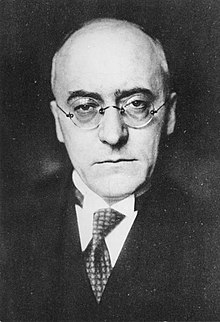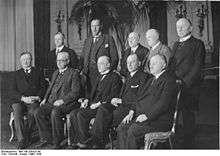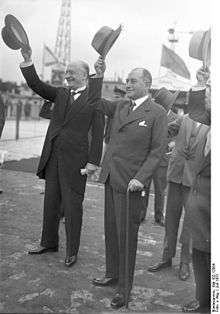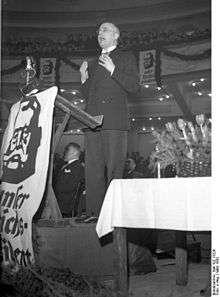Heinrich Brüning
Heinrich Aloysius Maria Elisabeth Brüning (![]()
Heinrich Brüning | |
|---|---|
 Brüning in 1930 | |
| Chancellor of the German Reich (Weimar Republic) | |
| In office 30 March 1930 – 30 May 1932 | |
| President | Paul von Hindenburg |
| Preceded by | Hermann Müller |
| Succeeded by | Franz von Papen |
| Reich Minister of Foreign Affairs | |
| In office 9 October 1931 – 30 May 1932 | |
| Chancellor | Heinrich Brüning |
| Preceded by | Julius Curtius |
| Succeeded by | Konstantin von Neurath |
| Reich Minister of Finance (acting) | |
| In office 20 June 1930 – 26 June 1930 | |
| Chancellor | Heinrich Brüning |
| Preceded by | Paul Moldenhauer |
| Succeeded by | Hermann Dietrich |
| Centre Party Chairman | |
| In office 6 May 1933 – 5 July 1933 | |
| Preceded by | Ludwig Kaas |
| Succeeded by | Party dissolved |
| Personal details | |
| Born | Heinrich Aloysius Maria Elisabeth Brüning 26 November 1885 Münster, Province of Westphalia, Kingdom of Prussia, German Empire |
| Died | 30 March 1970 (aged 84) Norwich, Vermont, U.S. |
| Resting place | Münster, Germany |
| Political party | Zentrum |
| Occupation | Academician Economist Activist |
| Military service | |
| Allegiance | |
| Branch/service | |
| Years of service | 1915–1918 |
| Rank | Lieutenant |
| Unit | Infantry Regiment No. 30, Graf Werder |
| Battles/wars | World War I |
| Awards | Iron Cross, 1st Class Iron Cross, 2nd Class |
A political scientist and Christian social activist with a PhD on the implications of nationalizing the British railway system, he entered politics in the 1920s and was elected to the Reichstag in 1924. Shortly after Brüning took office as Chancellor on 30 March 1930 he was confronted by an economic crisis caused by the Great Depression. Brüning responded with a tightening of credit and a rollback of all wage and salary increases. These policies increased unemployment and made Brüning highly unpopular, losing him support in the Reichstag. As a result, Brüning established a so-called presidential government, basing his government's authority on presidential emergency decrees invoking President Paul von Hindenburg's constitutional powers. Brüning announced his cabinet's resignation on 30 May 1932, after his policies of distributing land to unemployed workers had led him into conflict with the President and the Prussian land owners, and the President therefore had refused to sign further decrees.
Fearing arrest after the Nazi regime's ascent to power, Brüning fled Germany in 1934. After staying in Switzerland and the United Kingdom, he eventually settled in the United States. He lived in difficult economic conditions for his first years as a refugee from Nazism, but became a visiting professor at Harvard University in 1937 and was the Lucius N. Littauer Professor of Government at Harvard from 1939 to 1952. He warned the American public about Hitler's plans for war, and later about Soviet aggression and plans for expansion. He briefly returned to Germany in 1951 to take up a post as professor of political science at the University of Cologne, but returned to the United States in 1955 and lived out his days in retirement in Vermont. He became a member of the American Academy of Arts and Sciences in 1938.
Brüning remains a controversial figure in Germany's history, as historians debate whether he was the 'last bulwark of the Weimar Republic' or the 'Republic's undertaker', or both. Scholars are divided over how much room for manoeuvre he had during the depression and period of great political instability.[1] While he intended to protect the Republic's government, his policies, notably his use of emergency powers, also contributed to the gradual demise of the Weimar Republic during his chancellorship.
Early life and education
Born in Münster in Westphalia, Brüning lost his father when he was one year old and thus his elder brother Hermann Joseph played a major part in his upbringing. Although brought up in a devoutly Roman Catholic family, Brüning was also influenced by Lutheranism's concept of duty, since the Münster region was home to both Catholics, who formed a majority, and Prussian-influenced Protestants.
After graduating from Gymnasium Paulinum he first leaned towards the legal profession but then studied Philosophy, History, German and Political Science at Strasbourg, the London School of Economics and Bonn, where, in 1915, he received a doctorate for his thesis on the financial, economical and legal implications of nationalizing the British railway system. Historian Friedrich Meinecke, one of his professors at Strasbourg, had a major influence on Brüning.
Volunteering for the infantry, he was accepted despite his shortsightedness and physical weakness, and served in World War I from 1915 to 1918. He rose to lieutenant in infantry regiment No. 30, Graf Werder, and company commander by the end of the war. He was cited for bravery and awarded both the second and first class Iron Cross.[2]
Despite having been elected to a soldiers' council after the armistice of 11 November 1918, Brüning did not approve of the German Revolution of 1918–1919 which ended with the establishment of the Weimar Republic.
Rise in politics
Despite his reluctance to speak about his private life, it is assumed that his war experience and the war's aftermath persuaded him not to pursue his academic career, and he preferred to help former soldiers reintegrate into civilian life by assisting them finding employment or further their education.[3]
He collaborated with the social reformer Carl Sonnenschein and worked in the "Secretariat for social student work". After six months he entered the Prussian welfare department and became a close associate of Adam Stegerwald, the minister. Stegerwald, also the leader of the Christian trade unions, made him chief executive of the unions in 1920, a post Brüning retained until 1930.
As the editor of the union newspaper Der Deutsche (The German), he advocated a "social popular state" and "Christian democracy," based on the ideas of Christian corporatism.
In 1923 Brüning was actively involved in organizing the passive resistance in the "Ruhrkampf".
Brüning joined the Centre Party and in 1924 was elected to the Reichstag, representing Breslau.[2] In parliament, he quickly made a name for himself as a financial expert and managed to push through the so-called Brüning Law, which restricted the workers' share of income taxes to no more than 1.2 billion Reichsmarks.
From 1928 to 1930, he served as a member of the Prussian parliament. In 1929, after his election as leader of the Centre Party group in the Reichstag,[2] his party's agreement to the Young Plan was made conditional on paying for it through tax increases and budget cuts. This earned him President Hindenburg's attention.
As chancellor

Brüning was appointed chancellor by Hindenburg on 29 March 1930 when the grand coalition under the Social Democrat Hermann Müller collapsed. The government was still confronted with the economic crisis caused by the Great Depression. Brüning disclosed to his associates in the German Labour Federation that his chief aim as chancellor would be to liberate the German economy from the burden of continuing to pay war reparations and foreign debt. This would require an unpopular policy of tight credit and a rollback of all wage and salary increases (internal devaluation). Brüning's financial and economic acumen combined with his openness to social questions made him a candidate for chancellor and his service as a front officer made him acceptable to President Paul von Hindenburg.
The Reichstag rejected Brüning's measures within a month. President Hindenburg, already bent on reducing the influence of the Reichstag, saw this event as the "failure of parliament", and with Brüning's consent he called new elections. These elections cost the parties of the grand coalition their majority and brought gains to both the Communists and the National Socialists. This left Brüning without any hope of regaining a majority in parliament and forced him to base his administration on the presidential emergency decree (Notverordnung) of Article 48 coined the term "authoritative democracy" to describe this form of government, based on the cooperation of the president and parliament.
Brüning was somewhat ambivalent toward democracy. Soon after taking office, he sharply limited freedom of the press. By one estimate, 100 newspaper editions were banned every month.[4]
Hindenburg wished to base the government on the parties of the right, but the right-wing German National People's Party (DNVP) refused to support Brüning's government. To the president's dismay, Brüning had to rely on his own Centre Party, the only party that fully supported him, and on the toleration of the Social Democrats.

Brüning's measures were implemented in the summer by presidential decree, and this made him extremely unpopular among the lower and middle classes. As unemployment continued to rise, Brüning's cuts in both wages and public assistance, combined with rising prices and taxes, increased misery among workers and the unemployed. This gave rise to the slogan: "Brüning verordnet Not!" (Brüning decrees hardship), alluding to his measures being implemented by the Notverordnung.
These effects undermined the tacit support of the Social Democrats for the government, while the liberal and conservative members of Brüning's cabinet favoured opening the government to the right. President Hindenburg, pushed by his camarilla and military chief Kurt von Schleicher, also advocated such a move and insisted on a cabinet reshuffle, especially the removal of ministers Wirth and Guérard, both from the Centre Party.
The president's wishes also hampered the government's resolution in combatting the extremist parties and their respective paramilitary organisations. While the chancellor and president agreed that the Communists' and Nazis' brutality, intolerance and demagogy rendered them unfit for government, Brüning believed the government was strong enough to steer Germany through the crisis without the support of the Nazis.
Nonetheless, he negotiated with Hitler about toleration or a formal coalition, without yielding to the Nazis any position of power or full support by presidential decree. Because of these reservations the negotiations came to nothing and as street violence rose to new heights in April 1932, Brüning had both the communist "Rotfrontkämpferbund" and the Nazi Sturmabteilung banned. The unfavourable reaction in right-wing circles further undermined Hindenburg's support for Brüning.
Brüning agonized over how to stem the growing Nazi tide, especially since Hindenburg could not be expected to survive another full term as president should he choose to run again. If Hindenburg were to die in office, Hitler would be a strong favorite to succeed him.[5]
In his posthumously published memoirs Brüning claims, without support of contemporaneous documents, that he hit upon a last-ditch solution to prevent Hitler from taking power—restoring the Hohenzollern monarchy. He planned to persuade the Reichstag to cancel the 1932 presidential election and extend Hindenburg's term. He would have then had parliament proclaim a monarchy, with Hindenburg as regent. Upon Hindenburg's death, one of Crown Prince Wilhelm's sons would have been invited to assume the throne. The restored monarchy would have been a British-style constitutional monarchy in which real power would have rested with the legislature.[5]
He managed to garner support from all of the major parties except the Nationalists, Communists and Nazis, making it very likely that the plan would get the two-thirds majority required for passage. The plan foundered, however, when Hindenburg, an old-line monarchist, refused to support restoration of the monarchy unless Emperor Wilhelm II was called back from exile in the Netherlands. When Brüning tried to impress upon him that neither the Social Democrats nor the international community would accept any return of the deposed emperor, Hindenburg threw him out of his office.[5]
Foreign policy
In the international theatre, Brüning tried to alleviate the burden of reparation payments and to achieve German equality in the rearmament question. In 1930, he replied to Aristide Briand's initiative to form a "United States of Europe" by demanding full equality for Germany.
In 1931 plans for a customs union between Germany and Austria were shattered by French opposition. In the same year, the Hoover memorandum postponed reparation payments and in summer 1932, after Brüning's resignation, his successors would reap the fruits of his policy at the Lausanne conference, which reduced reparations to a final payment of 3 billion marks.
Negotiations over rearmament failed at the 1932 Geneva Conference shortly before his resignation, but in December the "Five powers agreement" accepted Germany's military equality.
Hindenburg's re-election and Brüning's fall

Hindenburg was not willing at first to stand for re-election as president, but subsequently changed his mind. In the 1932 presidential election, Brüning vigorously campaigned for Hindenburg along with virtually the entire German left and centre, calling him a "venerated historical personality" and "the keeper of the constitution". After two rounds of voting Hindenburg was re-elected with a substantial majority over his main opponent Adolf Hitler. However, Hindenburg considered it shameful to have been elected with the votes of "Reds" and "Catholes", as he called Social Democrats and the mostly Catholic Centre Party. He realised he was considered the lesser of two evils by them, and he compensated for this "shame" by moving further to the right. His failing health increased the camarilla's influence.
As Brüning gradually lost Hindenburg's support, the ban of the Nazi SA paramilitary organisation initiated by Minister Wilhelm Groener on 13 April 1932 sharpened the conflict and led to considerable ill-feeling between Hindenburg and his trusted friend Kurt von Schleicher. At the same time, he was viciously attacked by the Prussian Junkers, led by Elard von Oldenburg-Januschau, who opposed Brüning's policies of distributing land to unemployed workers in the course of the Eastern Aid (Osthilfe) programme and denounced him as an "Agro-bolshevik" to Hindenburg.
The president, having a personal conflict as owner of a highly indebted Junker estate, refused to sign any further emergency decrees. As a consequence Brüning announced his cabinet's resignation on 30 May 1932, "hundred metres before the finish", and was relieved of his office in a brief and undignified ceremony by Hindenburg. He firmly rejected all suggestions making the president's disloyal behaviour public because he considered such a move indecent, and still considered Hindenburg the "last bulwark" of the German people.
After his resignation
After his resignation, Brüning was invited by Ludwig Kaas to take over the leadership of the Centre Party, but the former chancellor declined and asked Kaas to stay. Brüning supported his party's determined opposition to his successor, Franz von Papen. He also supported re-establishing a working parliament by cooperating with the National Socialists, negotiating with Gregor Strasser.
After Adolf Hitler became chancellor on 30 January 1933, Brüning vigorously campaigned against the new government in the March 1933 elections. Later that month, he was a main advocate for rejecting the Hitler administration's Enabling Act, calling it the "most monstrous resolution ever demanded of a parliament." Having received assurances from Hitler that the Centre Party would not be banned he yielded to party discipline and voted in favour of the bill. With the Communist Party's deputies already banned from the Reichstag, only the Social Democrats voted against the law.
When Kaas was held up in Rome and resigned from his post as chairman of the Centre Party, Brüning was elected chairman on 6 May. Hoping to adapt to the post-Enabling Act order, the party adopted a watered-down version of the leadership principle; pro-Centre papers now declared that the party's members, or "retinue", would fully submit itself to Brüning. This only served to buy the party only a few more months of life. Prominent members were frequently arrested and beaten, pro-Centre civil servants were fired, and government officials began demanding that the party either dissolve or be banned. Bowing to the inevitable, Brüning dissolved the Centre Party on 5 July.
Exile and later years
After friends warned him, in 1934 Brüning fled Germany 27 days before the Night of the Long Knives[6] via the Netherlands, and settled first in the United Kingdom, and in 1935 in the United States. In 1937 he became a visiting professor at Harvard University, and he was the Lucius N. Littauer Professor of Government at Harvard from 1939 to 1952. He warned the American public about Hitler's plans for war, and later about Soviet aggression and plans for expansion, but in both cases his advice went largely unheeded.
In 1951, he returned to Germany, settling in Cologne in West Germany, where he taught as a professor of political science at the University of Cologne until he retired in 1953. Partly because of his dissatisfaction with chancellor Konrad Adenauer's politics he returned to the U.S. in 1955 where he revised the manuscript of his Memoirs 1918–1934 which was edited by his longtime assistant, Claire Nix.
Due to the memoirs' highly controversial content, they were not published until after his death in 1970. Parts of the memoirs are considered unreliable, not based on historical records, and a self-justification for his politics during the Weimar Republic.[7][8][9][10]
Brüning died 30 March 1970 in Norwich, Vermont,[11] and was buried in his home town of Münster.
References
- Anthony McElligott, Rethinking the Weimar Republic: Authority and Authoritarianism, 1916–1936, A & C Black, 2013, ISBN 9781849660273
- "Heinrich Brüning". Encyclopædia Britannica. Retrieved 2010-06-18.
- Luther, Hans (2006). Vor dem Abgrund 1930–1933. Reichsbankpräsident in Krisenzeiten, p. 115. Propyläen Verlag, Berlin.
- Evans, Richard J. (2003). The Coming of the Third Reich. New York City: Penguin Press. ISBN 978-0141009759.
- William Shirer, The Rise and Fall of the Third Reich (Touchstone Edition) (New York: Simon & Schuster, 1990)
- Gunther, John (1940). Inside Europe. New York: Harper & Brothers. p. 51.
- Lutz Graf Schwerin von Krosigk: Staatsbankrott. Die Geschichte der Finanzpolitik des Deutschen Reiches von 1920 bis 1945, geschrieben vom letzten Reichsfinanzminister. Musterschmidt, Göttingen 1975, S. 102; Philipp Heyde: Das Ende der Reparationen. Deutschland, Frankreich und der Youngplan. Schöningh, Paderborn 1998, S. 468 u.ö.
- Heinrich August Winkler: Weimar 1918–1933. Die Geschichte der ersten deutschen Demokratie. Beck, München 1993, S. 461–463; Gerhard Schulz: Von Brüning zu Hitler. Der Wandel des politischen Systems in Deutschland 1930–1933. (= Zwischen Demokratie und Diktatur. Verfassungspolitik und Reichsreform in der Weimarer Republik. Bd. 3) Walter de Gruyter, Berlin, New York 1992, S. 819; Philipp Heyde: Das Ende der Reparationen. Deutschland, Frankreich und der Youngplan. Schöningh, Paderborn 1998, S. 376.
- Harry Graf Kessler: Tagebücher 1918–1937. Frankfurt am Main 1961, S. 737–739.
- John Wheeler-Bennett: The Wooden Titan. Hindenburg in Twenty Years of German History. London 1936, SS. 353–54.
- "Heinrich Brüning". Encyclopædia Britannica. Retrieved 3 July 2014.
Bibliography
- Brüning, Heinrich (1947). Heywood, Robert B. (ed.). The Works of the Mind: The Statesman. Chicago: University of Chicago Press. OCLC 752682744.CS1 maint: ref=harv (link)
- Bracher, Karl Dietrich (1971), Die Auflösung der Weimarer Republik; Eine Studie zum Problem des Machtverfalls in der Demokratie (in German), Villingen: Ring-Verlag.
- Eschenburg, Theodor (1972), "The Role of the Personality in the Crisis of the Weimar Republic: Hindenburg, Brüning, Groener, Schleicher", in Holborn, Hajo (ed.), Republic to Reich The Making of the Nazi Revolution, New York: Pantheon Books, pp. 3–50, ISBN 0-394-47122-9.
- Patch, William (1998), Heinrich Brüning and The Dissolution of the Weimar Republic, New York: Cambridge University Press, ISBN 0-521-62422-3.
- Wheeler-Bennett, Sir John (2005), The Nemesis of Power: German Army in Politics, 1918-1945 (2nd ed.), New York: Palgrave Macmillan, ISBN 1-4039-1812-0.
External links
| Wikimedia Commons has media related to Heinrich Brüning. |
- Online-Biography of Heinrich Brüning (in German)
- Newspaper clippings about Heinrich Brüning in the 20th Century Press Archives of the ZBW
- Heinrich Burning Papers on Lecturing at Dartmouth College at Dartmouth College Library
| Political offices | ||
|---|---|---|
| Preceded by Hermann Müller |
Chancellor of Germany 30 March 1930 – 30 May 1932 |
Succeeded by Franz von Papen |
| Preceded by Julius Curtius |
Foreign Minister of Germany 9 October 1931 – 30 May 1932 |
Succeeded by Konstantin von Neurath |